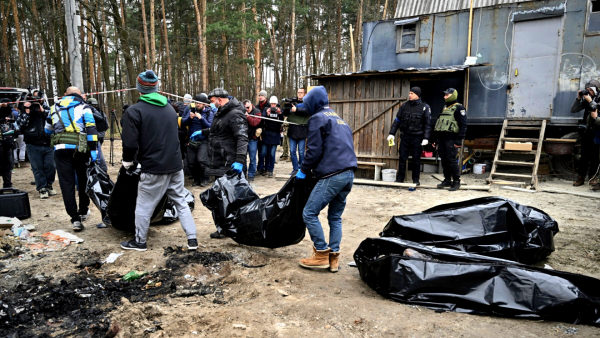The global shock caused by the unveiling of horrific scenes from the town of Bucha near Kyiv continues to cause reactions worldwide, as Ukrainian officials update the numbers of dead bodies found in the town massacred during the Russian invasion of Ukraine.
However, online people noticed that Meta's social media networks; Facebook and Instagram, blocked hashtags connected to the massacre.
As social media commentators protested the block of hashtags, considering it an attempt to help the Russians cover up for the crimes committed during their time in the town, before their withdrawal around March 30, 2022, Meta explained that the block was a brief, automated one performed by its algorithms.
This happened automatically because of the graphic content people posted using these hashtags. When we were made aware of the issue yesterday, we acted quickly to unblock the hashtags.
— Andy Stone (@andymstone) April 4, 2022
Meta explained that algorithms have been programmed to block graphic and violent content automatically.
As stated by Meta's Communications Director Andy Stone in a tweet, the owner of Facebook and Instagram acted quickly to unblock Bucha hashtags as soon as they were aware of the problem.
FB banned me for Bucha photos just now. The same ones they blurred and said they don't violate community standards. FFS, @Meta I am a journalist and the world NEEDS to see this. Can someone who maybe has some influence helo me maybe? pic.twitter.com/zLJcesxdex
— The Eastern Border???? (@Eastern_Border) April 4, 2022
Social media platforms have been facing numerous criticism amid the ongoing Russian invasion of Ukraine, related to its long-standing rules that have been amended for the first time, in an approach that has been perceived as serving one narrative against the other.
More discussions have followed online as Twitter announced plans to restrict accounts affiliated with the Russian government, as worldwide reactions get more intense following the Bucha massacre.
Then which individuals and country will twitter go after next if it doesn’t suit the US-narrative? ...Pakistan? Yemen? https://t.co/3iMIoIQPC8
— ThatDolma (@ThatDolma) April 6, 2022
For over a month of fighting now, online discussions have been focused on whether or not social media networks should remain neutral at times of war, allowing equal space for all views, or it should help limit violent rhetoric that serves to inflame the conflict.







